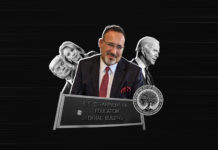When I arranged for an interview with Campbell Brown I expected to find a guarded television journalist and a person doubly calcified by the toxic swamp that is national education politics.
For years she has tangled with teachers’ unions, politicians, and internet attack artists, so by now she should be a portrait in cynicism.
A few minutes into our conversation I discovered her most annoying characteristic.
She’s an optimist.
I got her to admit my frustration with the “reform” movement’s two steps-forward-two-steps-back battle, but when I offered a dire reading of the tea leave, she refused to join.
That’s not to say she’s a Pollyanna. Far from it. She’s just confident education reform is the common sense mission and once the public sees that they will be won over.
The most pressing issue we discussed was the suspicious absence of K-12 education as an issue in the current presidential campaign.
She agreed that it’s a problem, but she’s more prone to being analytical rather than alarmed.
“You have two different dynamics going on,” she says.
“On the right with Republicans….generally what you have heard from them is ‘look, federal education policy is something that we wanna localize as much as possible, and therefore we don’t really consider education to be a national issue.”
She says the Right is offering “pretty standard fare” about abolishing the Department of Education and returning power to the states.
“That’s all fine and good,” she replies, “I don’t care if that’s what your belief …you still can’t expect to be president of the United States and not be able to articulate a vision for what public education should look like in this country.”
There’s a hint of urgency in her voice, but not warmth too. Brown’s candidates to talk about education in “a thoughtful way.”
It’s one thing to critique the federal power in education, it’s another to “demonstrate to us that you have a vision for how it needs to change.”
So far, “we haven’t heard that from anyone,” she says.
And on the other side of the aisle? She says it’s “pure politics.”
“Hillary Clinton…she was a big supporter of education reform back in her education days…a vocal supporter of charter schools, and with the endorsement now of the two largest teachers’ unions she’s really dialed that back and you’ve heard her making very, very different statements from the campaign trail.”
Clinton’s rival in the Democratic race fares no better.
“There’s a headline running on CNN right now that says ‘Bernie Sanders doesn’t support private charter schools.’ Well, as you and I both know there’s no such thing as private charter schools….We have major candidates running for president and major news organizations that are perpetuating something that is simply not true.”
When I ask her if she thinks education reform has pushed too hard and given America reform fatigue, she says no. She gives President Obama credit for pushing a strong reform agenda, and she feels reformers need to do a better job of taking stock of progress.
Yet, she admits there were problems.
Implementation of new testing schemes and teacher evaluation in New York led to backlash. School reformers won’t “put the genie back in the bottle.” We should brace ourselves for changes to our favored policies that were implemented poorly.
She warns that this isn’t just a “PR moment that we need to get through.”
Attempts to get Brown to see that anarchy might be the only way out of this mess failed. I argued we’re always only one election away from reversing everything we’ve gained over several years, but she wouldn’t indulge in my darkness.
“I’m more of an optimist on this stuff quite honestly,” she said.
“I think about New York a lot….before Mayor Bloomberg you had no charter school movement in New York City and now it’s massive and impacting so many kids and making such a huge difference. That’s happened in a relatively short period of time.”
It surprises me that even with the pending setbacks in New York, including a Governor who is walking back his support for teacher evaluations and school reform, she chooses to take the long view.
She says “the best thing we can do…as opposed to anarchy, is work really hard to educate people and organize people.”
Brown’s optimism is likely the product of two things.
The first is her relative privilege. She says “I’m very clear about the opportunities that I have had and the opportunities that my kids have had. I worked in television news, when I had children I was in a position to give them whatever kind of education I wanted…”
The second is her empathy for those who have not had the opportunities that she has. As she tells it, she is an accidental school reformer who saw the reality of bad schools through the eyes of a dear friend.
“[T]he thing that opened my eyes to this for the very first time was a close, close friend of mine who worked with me in TV news who had no money, who lived in a neighborhood that was zoned for a failing school and when her kid became school aged she was trying to figure out what to do and literally was trapped…had no choice, and no options, couldn’t afford the Catholic school that was nearby that she was trying to get her kid into.”
Out of desperation Brown’s friend made a deal with someone who lived in a neighborhood zoned into a better school. The mother – a hairdresser – would offer a lifetime of free hair service in exchange for the use of the better address so her daughter could enroll in a great school.
When Brown inquired about the legality of enrolling a child in school using an incorrect address the mother asked her “what would you do if you were me?”
The answer was simple.
It’s what drives Brown’s work today.
Please take a listen to the podcast. A note of warning, I was not in the studio for this show. You will hear that I recorded by phone. Otherwise, it was a great conversation.









